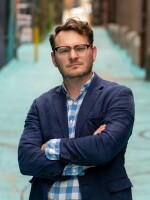Toxic air pollution disproportionately impacts people in west and south Louisville, but over the last two decades there have been improvements.
And those improvements are the result of people working together, many on a grassroots level.
People like Chance Hughes, who was picking up trash in California Park on a sunny day in late March.
Hughes lives in the Russell neighborhood and has his own nonprofit. And while we were talking, he kept coming back to this idea that, for things to change, it takes more than the actions of any single person.
“We’re just trying to make a change and you know it’s a village, so you know, it takes a village to change everything,” he said.
Louisville's toxic air pollution has gotten better over the years, but problems still remain. More than 80 percent of the toxic air pollution released in 2017 was in west and south Louisville.
In fact, today, people living near toxic air polluters are nearly twice as likely to live in poverty and nearly three times as likely to be a person of color, according to a WFPL analysis.
But throughout my reporting, I’ve found people dedicated to improving the city’s air quality: students, scientists, local officials and activists.
Science
At the University of Louisville, scientists like Dr. Matt Cave are working to understand how pollution impacts health. Cave is testing a hypothesis that harmful chemical exposures may compromise our body’s natural systems, making it harder to defend itself against other problems, like high-fat diets.
“What I think is happening, is the exposures in and of themselves, especially at low levels may not be sufficient to cause the disease, but they may impair the body’s natural defense against high-fat diet,” he said.
Cave works at the Envirome Institute at U of L, the same place that is working on a unique scientific experiment that will plant trees in a neighborhood in Louisville to study how they impact heart health, diabetes and obesity.
Earlier this year, Institute Director Aruni Bhatnagar published a study examining the link between plants and overall health. It found people who live in more densely vegetated areas have lower levels of stress and better heart health.
Government
At the Louisville Air Pollution Control District, local officials are monitoring polluters to keep emissions as low as they can. Director Keith Talley said they’re also working to bring a machine called a gas chromatograph online. It will be the first monitor to actually test the city’s air for toxic pollution since another program lost funding in 2013.
“What the gas chromatograph does is allow us to really look at it at a real-time basis with hourly numbers,” Talley said.
That monitor will test for dozens of harmful pollutants and will be set up in an area that was previously identified as the location of highest impact from pollution wafting over from Rubbertown, the city’s largest concentration of chemical facilities.
Over at the health department, Administrator Aja Barber says we need to have conversations about protecting the environment because that will protect people’s health.
“I’m very, very proud to say the Center for Health Equity and the Department of Public Health and Wellness is really moving this conversation forward of how do we redesign our systems and structures in a way that serves everyone who lives here with an understanding of who has not been served in the past,” Barber said.
Companies
Clariant Specialty Chemicals releases harmful pollutants that increase the cancer risk for nearby neighborhoods, according to EPA data. But Head of Operations Chandra Ratnasamy says Clariant is researching and developing ways to further reduce the facility's pollution, and in the case of at least one cancer-causing pollutant, trying to remove it completely.
“We have a lot of research projects which look at developing formulations that would take out chromium completely,” she said.
Meanwhile, American Synthetic Rubber Company, which used to release a large amount of cancer-causing pollution, has reduced emissions from the most harmful pollutant, 1,3 butadiene, by more than 90 percent since 2003, according to spokesman Eric Bruner.
Advocacy
Then there are people like Eboni Cochran, the co-director of Rubbertown Emergency ACTion, who has advocated for better air quality in the West End for more than 15 years. She wants to help empower other residents like herself so that they too, can speak out against injustices in their communities.
“So we need to groom new folks so that you know we can share the responsibility, everybody has tasks, and I think that’s going to be significant for us to sustain this and be consistent,” she said.
The people Cochran are talking about are already out there, like 17-year-old Destine Grigsby. In February, Grigsby went to Washington D.C. to protest for the Green New Deal at Sen. Mitch McConnell’s office. But she first got involved with the environmental movement when she was advocating for better air quality in Rubbertown, and she’s still continuing that work.
“All throughout my community, there are people in west Louisville choking on the air they breathe because constantly our local politicians, continue to, instead of standing with us, they side with corporations and allow them to pollute toxic carcinogens into our air,” Grigsby said.
The problems that we face are large and complex, and there’s no one-size fits all solution. It takes the work of all people with their myriad skills, expertise and positions to make a change. Or as Chance Hughes said, it takes a village.
This is the fifth of several stories examining Louisville’s toxic air pollution and its disparate impacts. To read the entire series, click here.




